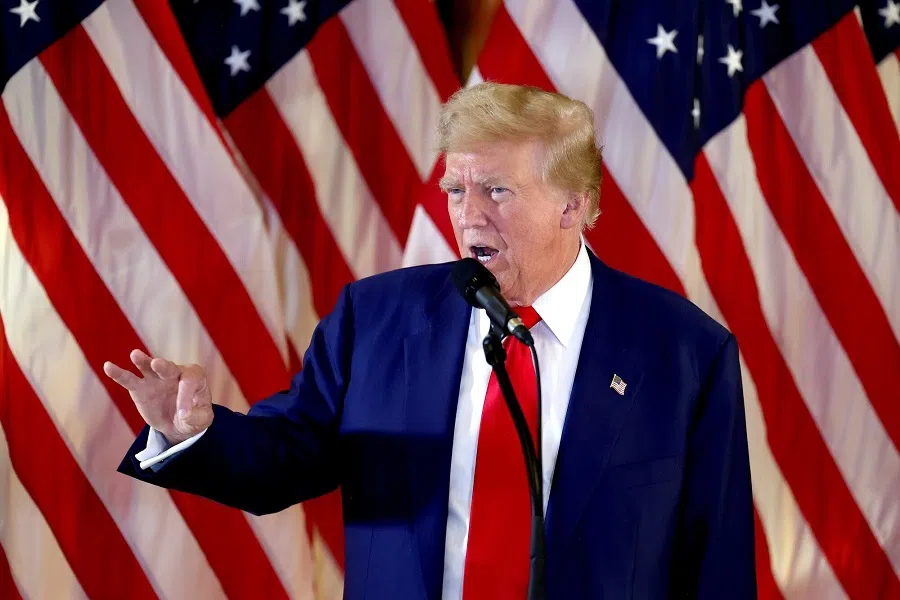Can the West preserve US hegemony?
The US is in an era of weak hegemony, and the only way to maintain its leadership is to form a collective Western hegemony, says Chinese commentator Song Zhongping.

The current international society remains centred around US hegemony as the primary pillar of the international order. But as US influence weakens, it has no choice but to pursue alternative strategies to maintain leadership, such as constructing a US-led Western collective hegemony.
Transitioning from global hegemony to a Western collective hegemony represents a strategic shift necessary for the US to preserve its influence during this era of waning hegemony.
Suppressing emerging countries
The US made heavy preparations to ensure a Western collective hegemony — notably by containing emerging countries to safeguard its own position.
Countries including China, Russia, South Africa, India and Brazil have continued developing their economies and technological competencies. This has raised concerns for the US-led Western world that these emerging countries would challenge the US’s global hegemony and the current international order.
Whether through rhetoric rejecting challenges to global rules centred around the US order, or through actions rallying Western countries to suppress emerging nations, the goal is to safeguard the post-World War II international order from any change. After all, behind the rules and order that the US clamours about lies its hegemony.

US hegemony is evident in the four areas of technology, military, order and finance; but technological hegemony stands out as the most pivotal. The US felt that the development of emerging countries posed a serious threat to its technological hegemony and left no stone unturned to suppress these countries.
The US is especially worried about China’s rapid development in technology and its ambitious initiatives for technological research. There is a growing concern that losing its technological edge could signal the decline of US hegemony.
... even in the long run, the US will not decline, but its share on a global scale will be reduced — this is a fundamental truth.
A weak US hegemony
Today, the US can no longer sustain global hegemony solely through its own national strength, signalling the quiet arrival of an era characterised by declining American hegemonic influence.
Despite the US’s ongoing advancements in technology, military, and finance, its global share of strength is declining. This is clearly demonstrated with the G7.
According to the International Monetary Fund, the combined GDP of the G7 accounted for 44.9% of the world in 1995, but had significantly dropped by 2010 to only 34.3%. By 2023, the combined GDP fell even more to a mere 29.9%. Meanwhile, BRICS countries such as China, India and Russia saw their combined GDP account for 32.1% of the world; ahead of the G7 by 2.2 percentage points. These statistics showed that the US-led G7 has already lost its once complete leadership of the world.
Can we therefore conclude that the US has declined? Certainly not. In fact, even in the long run, the US will not decline, but its share on a global scale will be reduced — this is a fundamental truth.

Hence, in the face of emerging countries, it is evident that the US cannot shoulder the burden of global hegemony alone; it can only hang on to the era of weak hegemony. From the US’s perspective, it must consider the need to rally other countries to collectively form a strong global hegemony, in order to transform the US’s era of weak hegemony into a much-desired strong hegemony.
... it is difficult for Western countries to maintain the “colonial rule” — in the broad sense — of the past, especially since emerging countries and various developing countries are rapidly growing, pushing for decolonisation, de-hegemonisation and even de-dollarisation...
Western anxiety amid complete decolonisation
However, when we turn our gaze on the US-led Western countries, we find them confronting a host of new challenges, along with severe collective anxiety.
The G7 represents the core interests of Western countries, but they are now grappling with significant collective anxiety due to challenges from emerging nations. Former colonisers have lost their colonial rule and erstwhile hegemons have seen their dominant positions erode. The old Western-led world order is no longer compatible with the modern international order.
Thus, it is difficult for Western countries to maintain the “colonial rule” — in the broad sense — of the past, especially since emerging countries and various developing countries are rapidly growing, pushing for decolonisation, de-hegemonisation and even de-dollarisation, all of which have become the focus and direction of today’s development.

Against this backdrop, Western countries will inevitably fall into severe collective anxiety since they have lost their glory, their international standing is being threatened and their vital interests are “damaged”. And this collective anxiety is exactly what the US wants as it aligns with its practical needs.
The US can use it to hold the West hostage on the same side in jointly containing the development of emerging countries and safeguard the West’s collective interest, i.e. collective hegemony. But it must be stressed that the US is not a Western country — whether in the narrow or broad sense.
... only by banding together with other Western countries, and baiting and binding them with ideologies and values can a Western hegemony be formed, and the US be able to fulfil its ultimate dream of becoming a strong hegemon.
Creating a US-led Western hegemony
The US knows very well that the era of weak hegemony is more aligned with the reality of the American state. Since the US is well aware that it cannot be the only hegemon, it certainly has to come to terms with the harsh reality.
What should the US do now that it has recognised this? It needs to create a US-led Western hegemony; because only then can it adapt to the reality of the era of weak hegemony and usher in an era of strong Western hegemony that it anticipates.
That is to say, Western hegemony is an indispensable and important part of the era of strong hegemony that the US is attempting to create. The US is unable to fight against countries such as China and Russia with its own strength — only by banding together with other Western countries, and baiting and binding them with ideologies and values can a Western hegemony be formed, and the US be able to fulfil its ultimate dream of becoming a strong hegemon.

Notably, the US has long held its allies hostage, especially the Western countries. But in the former era of strong US hegemony, the US could have the final say. Conversely, in the current era of weak hegemony, the US can only consider leveraging the collective power of the West to jointly fight against the challenge of emerging countries. From the US’s perspective, it will certainly consider persuading more countries to join its camp to safeguard its core interests.
If the US cannot effectively control emerging countries, it would be difficult to safeguard its weak hegemonic position.
Attack those that stand out
Notably, to defend the era of weak hegemony, the US has to attack those emerging countries that “stand out”. But it is now incapable of attacking emerging countries one-on-one. Instead, it must rely on the strength of its allies to fight its opponents around the world, such as Iran and Russia, its challengers in the Middle East and Europe respectively. Not forgetting the fact that it is also striving to contain China in the Indo-Pacific region.
If the US cannot effectively control emerging countries, it would be difficult to safeguard its weak hegemonic position. The envisioned collective Western hegemony may also falter, let alone achieving the desired upgrade from a weak hegemonic era to a strong one.
This is the fundamental reason why the US, in order to safeguard Western hegemony and the era of weak hegemony, has to bravely take on countries that challenge Western hegemony.

But we must also understand the true essence of the American state — what former US President Donald Trump referred to as “America First”. This doctrine implies that the US will not honour its promises to its allies: the right of collective self-defence and its role as a “nuclear umbrella”.
Although Western hegemony is an integral part of the US’s era of weak and strong hegemony, if the interests of Western allies are not aligned with America’s national security interests, the US will forgo the collective security of its allies and only consider its own interests.
Compared with the security and core interests of its allies, the US is more concerned about emerging countries, especially political opponents with the capability to attack the US. Thus, it is doing all it can to weaken their ability to do so through coercive means and institutional arrangements.
The US is a very pragmatic and utilitarian country. It aims to have allies bear the costs of its interests rather than vice versa. This is the fundamental manifestation of the US-led Western hegemony that the US hopes to create.





